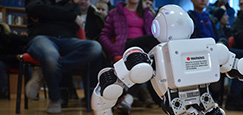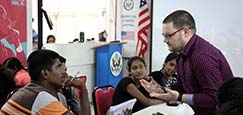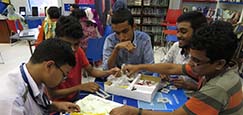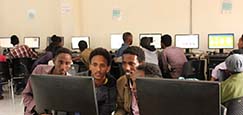A modern American Space is a physical venue for public engagement with foreign target audiences in support of United States foreign policy objectives.
American Spaces should offer a welcoming and inspiring environment, trained staff, and modern technologies necessary to connect with foreign publics, in person and virtually, in support of U.S. national interests and the mission of the Department of State. As a key element, Spaces should offer dynamic and interesting programming created to attract and engage target audiences in dialogue and activities of relevance to U.S. foreign policy interests and the specific goals of the U.S. Mission in the host country. The Space offers opportunities to build bridges between the people of the United States and the host country, increasing collaboration, and partnership. The Space is configured and equipped to promote free-flowing and open dialogue, showcasing the breadth and depth of American values, ideals, ideas, and opinions.
An American Space is a collaborative laboratory where citizens, alumni, all mission agencies, private and public partners and others can explore and be inspired by new ideas, skills, and opportunities that have the power to bring positive change to individual lives, communities, the host country, bilateral and regional relations, and global challenges.
A highly-functioning American Space is a physical location, within easy commuting distance for target audiences, that is open sufficient hours to allow programming to take place at times that are amenable for the desired audience. For example, if working professionals are the target audience, the Space is open in the evening and on weekends to encourage their participation.
The Space conforms to The Office of American Spaces and Educational Advising’s Open Access Principles, including:
- Open public access. Visitors need to be allowed to come into the American Space without an appointment during regular and consistent public hours established by post for the Space. No prior appointment should be necessary; no prior security access request should be required; and visitors should not have to be badged.
- Unescorted access. After passing security screening, visitors should be allowed to proceed to the American Space unescorted.
- Separate security screening. At posts with a high volume of visitors, separate security screening should be provided for American Spaces visitors so they do not have to wait in long lines (such as those used for visitors to consular operations).
- Personal electronic devices allowed. Visitors to the American Space need to be allowed to bring their own personal electronic devices into the Space and to use them there.
- Wireless internet access. American Spaces visitors need to be able to connect their own personal electronic devices (laptops, smart phones, tablets, etc.) to a Wi-Fi network in the Space, and the network needs to provide the best-available bandwidth.
American Spaces have sufficient resident staff, contractors, partners, and volunteers to conduct scheduled programs as well as allow for “walk in traffic.” The staff are competent in core areas of customer service, program and project management, utilization of digital tools to identify and engage target audiences, and programming and outreach development. Staff are good public speakers, comfortable in using both English and host country languages. They effectively use strategic planning and changing technology to refine their skills and outreach.
The Space actively markets its offerings and programs via social/print media to attract target audiences. Spaces prepare an annual plan, leveraging partners and all mission agencies and sections to deliver content that advances U.S. interests. The Space takes a “whole of mission” approach to ensure support and usage from the entire post. The COM and other senior leadership use the Space as a key platform for lectures, discussion sessions, meetings, and events.
American Spaces offer high-quality programming and services covering the six (6) core pillars, with balance among the pillars appropriate to mission foreign policy objectives:
- Information about the USA
- Alumni Engagement
- Educational Advising
- English Language Learning
- Skills Building
- Strategic and Cultural Programs
The technology in this Space is top-quality and allows for visitors to connect virtually with counterparts in other American Spaces in the country/region, the United States, and to communicate and collaborate globally. The Space offers visitors the chance to use new technology and encourages them to bring in their own devices, making the experience participatory and social, and multiplying the impact. Conversations and dialogue started in this Space can spread and continue long after the initial engagement.
American Spaces promote critical thinking and thoughtful discussion of issues important to the U.S. relationship with the host country, and U.S. global interests. Spaces serve as developmental platforms for people, projects, and products, offering room to contemplate, coordinate and fabricate. They enhance training and transfer of both hard and soft skills. The kinds of training and developmental opportunities provided through programming are specifically aligned with the public diplomacy goals and integrated country strategy of the mission. The staff and relevant U.S. mission work together to collect and analyze qualitative and quantitative data to define target audiences, tailor programming, strategically allocate resources, and evaluate programming and outcomes; providing reporting as required or appropriate.
Through a whole of mission approach and high capability and quality, American Spaces are a strategic tool to engage key foreign audiences in dialogue on the issues that matter most.




